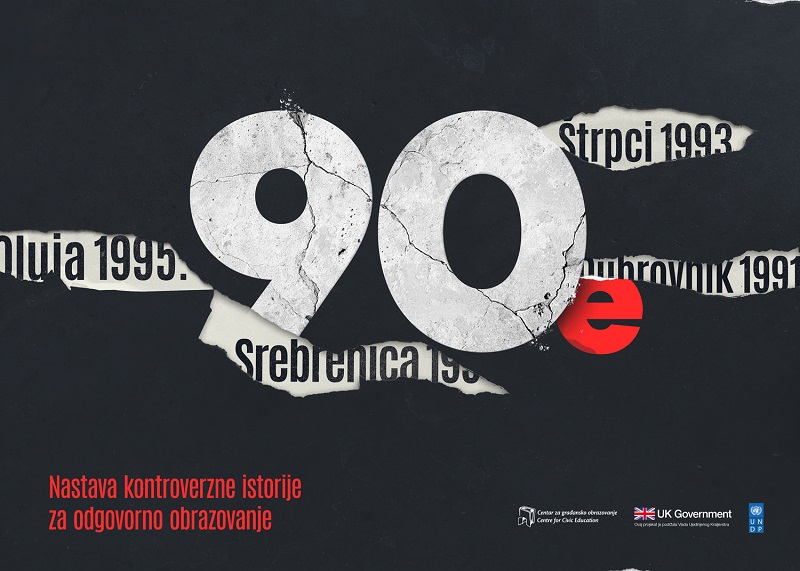In November, Centre for Civic Education (CCE) announced a call for works that provide examples of good practice on the theme ‘Responsible education through teaching about the 90s’, to which a large number of quality workshops have applied. The CCE editorial team selected 15 workshops, authored by teachers from different educational institutions and municipalities.
The following workshops were selected:
- Marija Vujošević (Gymnasium ‘Stojan Cerović’, Nikšić): On the trail of Srebrenica
- Lazar Aranitović (Primary school ‘Salko Aljković’, Pljevlja): Camps during the 90s wars
- 3. Vukadin Nišavić (Gymnasium ‘Panto Mališić’, Berane) and Filip Kuzman (National Museum of Montenegro, Cetinje): Life under siege (Sarajevo 1992-1996)
- Tatjana Šaletić (Gymnasium ‘Petar I Petrović Njegoš’, Danilovgrad) and Vesna Kovačević (Gymnasium ‘Slobodan Škerović’, Podgorica): Violence against children
- Violeta Stojkanović (Gymnasium ‘Tanasije Pejatović’, Pljevlja): War through a children’s Perspective
- Ljubica Vučinić (Primary school ‘Branko Brinić’, Tivat) and Violeta Stojkanović (Gymnasium ‘Tanasije Pejatović’, Pljevlja): War stories
- Ljiljana Bajčetić (Gymnasium ‘Tanasije Pejatović’, Pljevlja): Notes vs bullets
- Rade Vujović (Primary school ‘Vladimir Nazor’, Podgorica): Culturicide during the 90s wars
- Radomir Radonjić (Gymnasium ‘Slobodan Škerović’, Podgorica): War against culture
- Vukadin Nišavić (Gymnasium ‘Panto Mališić’, Berane) and Filip Kuzman (National Museum of Montenegro, Cetinje): Dubrovnik – a crime against culture
- Vukadin Nišavić (Gymnasium ‘Panto Mališić’, Berane) and Filip Kuzman (National Museum of Montenegro, Cetinje): Culturicide on the example of the old bridge in Mostar
- 12. Miloš Mrvaljević (Primary school ‘Vladimir Nazor’, Podgorica): War ideology and nationalism
- 13. Ana Vukosavović Ćetković (Secondary school ‘Spasoje Raspopović’, Podgorica) i Milosava Mrdak Mitrović (Gymnasium ‘Slobodan Škerović’, Podgorica): Misuse of media propaganda in the conflicts of the 90s
- Vesna Kovačević (Gymnasium ‘Slobodan Škerović’, Podgorica) and Zvezdana Lakić (Secondary school ‘Ivan Uskoković’, Podgorica): Economy of Yugoslavia during the Civil War (1992-2000)
- Lazar Aranitović (Primary school ‘Salko Aljković’, Pljevlja): Football and war
In addition to meeting the technical requirements of the call, when selecting workshops, a number of criteria that characterize examples of good practice were evaluated, such as the use of innovative teaching methods and forms of work: meeting the basic didactic principles of teaching; application of multiperspectivity methods in teaching; developing pupils’ critical thinking; raising awareness and developing dialogue on the common past to achieve reconciliation; strengthening teachers’ competencies on how to teach controversial and sensitive issues in teaching history, civic education, sociology and subjects from the group of social sciences. The authors of the selected workshops will be informed about the details of publishing workshops and will have the opportunity to present them at the training for professors who teach history and other subjects from the group of social sciences, which we intend to organize in February 2022.
Also, in addition to the quality of the workshops, the editorial team also focused on the representation of themes that have not been covered so far or significantly complement the formal educational process.
The prize competition is part of the activities of the project ‘Teaching Controversial History for Responsible Education’, conducted by the CCE, supported by the Regional War Crimes Project (RWC), which is implemented by the United Nations Development Program (UNDP) with the support of the UK Government.
Miloš Vukanović, Project coordinator

